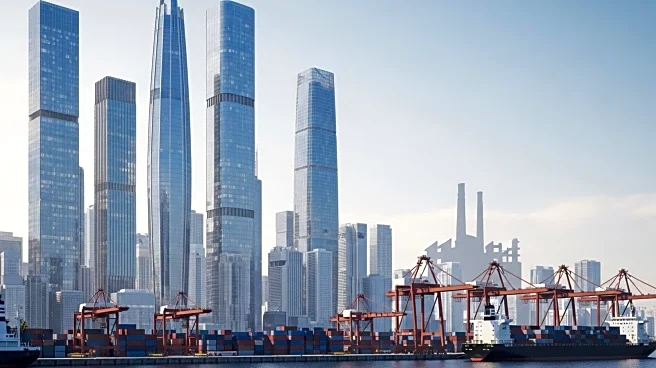What's Happening?
Singapore's economy expanded by 2.9% year-on-year in the third quarter, surpassing economists' expectations of a 1.9% increase. However, this growth represents a slowdown from the revised 4.5% expansion in the second quarter. The Ministry of Trade and Industry reported that manufacturing was a significant drag on growth, with output declines in biomedical and general manufacturing clusters. The construction sector also experienced a slowdown, rising 3.1% compared to 6.2% in the previous quarter. The services sector growth decelerated to 0.2%, affected by contractions in wholesale and retail trade, as well as transportation and storage.
Why It's Important?
The slowdown in Singapore's economic growth is significant as it reflects the broader impact of global trade headwinds, particularly affecting export-driven sectors like manufacturing. The decline in manufacturing output could have implications for employment and investment in the sector, potentially affecting Singapore's economic stability. The slowdown in the services sector, especially in wholesale and retail trade, indicates reduced consumer spending and business activity, which could further dampen economic prospects. This development is crucial for policymakers and businesses as they navigate the challenges posed by global economic uncertainties.
What's Next?
Singapore's central bank has warned of slower growth in 2026, suggesting that economic challenges may persist. Policymakers may need to consider measures to stimulate growth, such as fiscal incentives or support for affected industries. Businesses might need to adapt to changing market conditions, possibly by diversifying their operations or exploring new markets. The government may also focus on enhancing productivity and innovation to counteract the effects of global trade disruptions.
Beyond the Headlines
The economic slowdown in Singapore could have broader implications for regional trade dynamics, as the country is a key player in Southeast Asia's economy. The decline in manufacturing output may prompt discussions on the need for economic diversification and resilience against external shocks. Additionally, the slowdown could influence Singapore's strategic economic policies, including its approach to international trade agreements and partnerships.










